An elevation in the city of Sarajevo, Bosnia and Herzegovina, covered in a thick layer of fog, on Monday. Due to high levels of NO2 (nitrogen dioxide) in the air over the city and a certain meteorological condition, residents of Sarajevo were recommended to reduce their movement in the streets and to reduce car traffic: photo by Fehim Demir/EPA, 21 December 2015
I work all day, and get half-drunk at night.
Waking at four to soundless dark, I stare.
In time the curtain-edges will grow light.
Till then I see what's really always there:
Unresting death, a whole day nearer now,
Making all thought impossible but how
And where and when I shall myself die.
Arid interrogation: yet the dread
Of dying, and being dead,
Flashes afresh to hold and horrify.
The mind blanks at the glare. Not in remorse
-- The good not done, the love not given, time
Torn off unused -- nor wretchedly because
An only life can take so long to climb
Clear of its wrong beginnings, and may never;
But at the total emptiness for ever,
The sure extinction that we travel to
And shall be lost in always. Not to be here,
Not to be anywhere,
And soon; nothing more terrible, nothing more true.
This is a special way of being afraid
No trick dispels. Religion used to try,
That vast, moth-eaten musical brocade
Created to pretend we never die,
And specious stuff that says No rational being
Can fear a thing it will not feel, not seeing
That this is what we fear -- no sight, no sound,
No touch or taste or smell, nothing to think with,
Nothing to love or link with,
The anaesthetic from which none come round.
And so it stays just on the edge of vision,
A small, unfocused blur, a standing chill
That slows each impulse down to indecision.
Most things may never happen: this one will,
And realisation of it rages out
In furnace-fear when we are caught without
People or drink. Courage is no good:
It means not scaring others. Being brave
Lets no one off the grave.
Death is no different whined at than withstood.
Slowly light strengthens, and the room takes shape.
It stands plain as a wardrobe, what we know,
Have always known, know that we can't escape,
Yet can't accept. One side will have to go.
Meanwhile telephones crouch, getting ready to ring
In locked-up offices, and all the uncaring
Intricate rented world begins to rouse.
The sky is white as clay, with no sun.
Work has to be done.
Postmen like doctors go from house to house.
Philip Larkin (1922-1985): Aubade, drafted 1974, completed 29 November 1977, first published in Times Literary Supplement, 23 December 1977; also appears in Poems 1946-1983, from Collected Poems (1988)
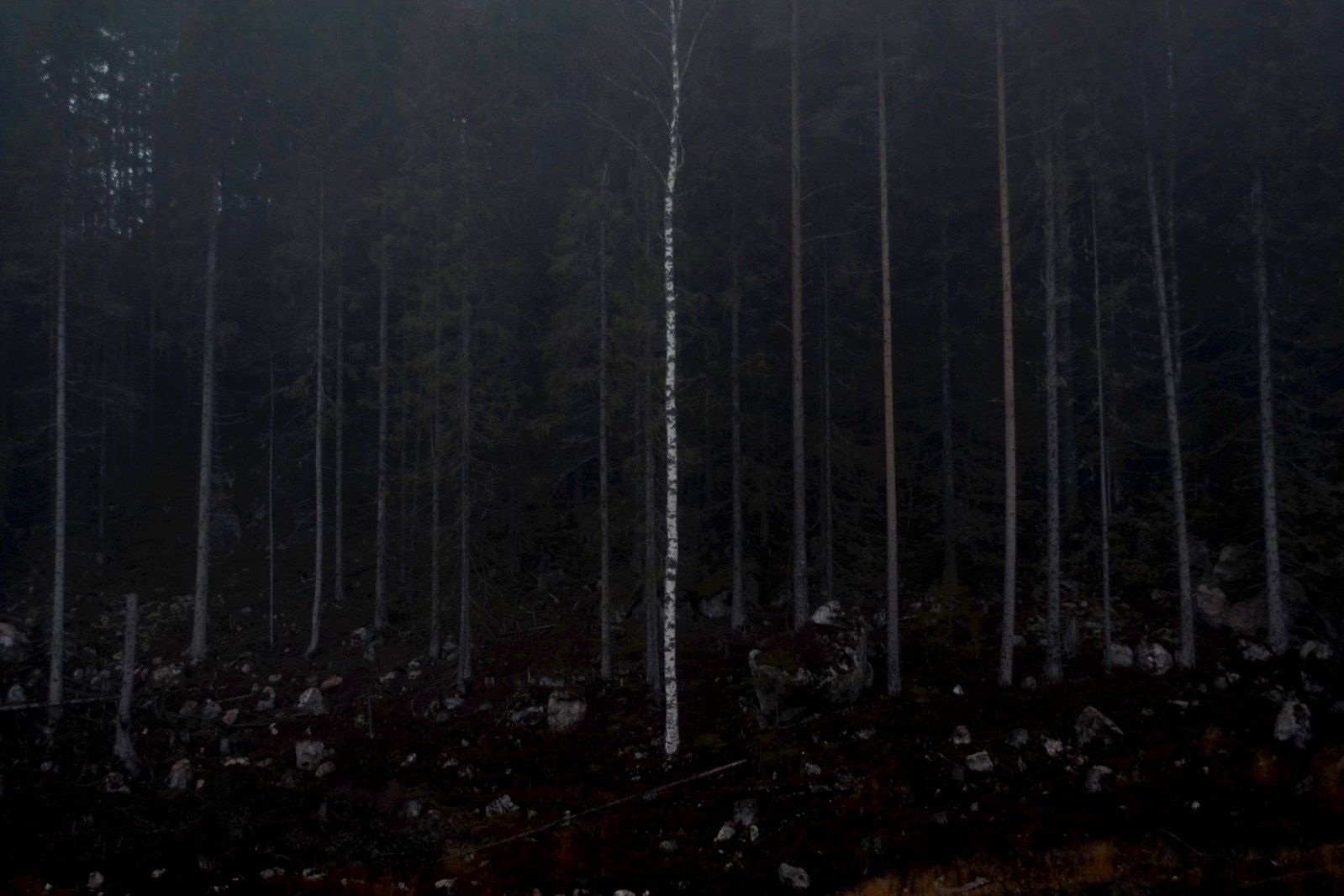
Many thanks for writing so kindly about my mother. It has been a depressing year since about March, when she began to deteriorate (she had been in a nursing home for nearly six years), and the last few months of her life were scarcely livable. She would have been 92 in January! Yesterday my sister and I went to Lichfield (where my branch of Larkins come from) and saw her ashes interred next to my father's, in what the Rector said would be the last burial at the Old Churchyard, wch wd now be handed over to the Council to be 'landscaped' into a vandals' playground, or some such nonsense. I expect I shan't see all the old Larkin graves again (one of 'Phillip Larkin', d. 1879), as they will all be levelled and the stones taken away.
I don't know whether it's a result of all this but I feel very disinclined to observe Christmas even in the few rudimentary ways I usually do. Depression hangs over me as if I were Iceland. A succession of duties have occupied me... I can't imagine how I ever found time to write poems, let alone had the inclination, though I did round off an old one lately and it will appear in the TLS called Aubade.
Waking at four to soundless dark, I stare.
In time the curtain-edges will grow light.
Till then I see what's really always there:
Unresting death, a whole day nearer now,
Making all thought impossible but how
And where and when I shall myself die.
Arid interrogation: yet the dread
Of dying, and being dead,
Flashes afresh to hold and horrify.
The mind blanks at the glare. Not in remorse
-- The good not done, the love not given, time
Torn off unused -- nor wretchedly because
An only life can take so long to climb
Clear of its wrong beginnings, and may never;
But at the total emptiness for ever,
The sure extinction that we travel to
And shall be lost in always. Not to be here,
Not to be anywhere,
And soon; nothing more terrible, nothing more true.
This is a special way of being afraid
No trick dispels. Religion used to try,
That vast, moth-eaten musical brocade
Created to pretend we never die,
And specious stuff that says No rational being
Can fear a thing it will not feel, not seeing
That this is what we fear -- no sight, no sound,
No touch or taste or smell, nothing to think with,
Nothing to love or link with,
The anaesthetic from which none come round.
And so it stays just on the edge of vision,
A small, unfocused blur, a standing chill
That slows each impulse down to indecision.
Most things may never happen: this one will,
And realisation of it rages out
In furnace-fear when we are caught without
People or drink. Courage is no good:
It means not scaring others. Being brave
Lets no one off the grave.
Death is no different whined at than withstood.
Slowly light strengthens, and the room takes shape.
It stands plain as a wardrobe, what we know,
Have always known, know that we can't escape,
Yet can't accept. One side will have to go.
Meanwhile telephones crouch, getting ready to ring
In locked-up offices, and all the uncaring
Intricate rented world begins to rouse.
The sky is white as clay, with no sun.
Work has to be done.
Postmen like doctors go from house to house.
Philip Larkin (1922-1985): Aubade, drafted 1974, completed 29 November 1977, first published in Times Literary Supplement, 23 December 1977; also appears in Poems 1946-1983, from Collected Poems (1988)

It went so far, it was so bad (that the best thing was that you were not like them): photo by y Coyhand, 15 November 2015
Many thanks for writing so kindly about my mother. It has been a depressing year since about March, when she began to deteriorate (she had been in a nursing home for nearly six years), and the last few months of her life were scarcely livable. She would have been 92 in January! Yesterday my sister and I went to Lichfield (where my branch of Larkins come from) and saw her ashes interred next to my father's, in what the Rector said would be the last burial at the Old Churchyard, wch wd now be handed over to the Council to be 'landscaped' into a vandals' playground, or some such nonsense. I expect I shan't see all the old Larkin graves again (one of 'Phillip Larkin', d. 1879), as they will all be levelled and the stones taken away.
I don't know whether it's a result of all this but I feel very disinclined to observe Christmas even in the few rudimentary ways I usually do. Depression hangs over me as if I were Iceland. A succession of duties have occupied me... I can't imagine how I ever found time to write poems, let alone had the inclination, though I did round off an old one lately and it will appear in the TLS called Aubade.
Philip Larkin to Winifred Bradshaw (née Arnott), 13 December 1977, in Selected Letters of Philip Larkin 1940-1985 (1992)
Very
good of you to write about 'Aubade' and the feelings that inspired
it... several people have said they liked it as a poem, but avoided
mentioning its subject... It's hard to say whether fear of death is a
neurotic condition (of course, I don't know what a neurotic condition
is, but still). My first impulse is to say that it is simply seeing
things clearly... or that it's simply being more sensitive (like
worrying about cruelty to animals (I do that too). But does one's fear
increase in direct ratio to the nearness of death? Is an adolescent less
frightened than an old age pensioner? Is a man in an air raid more
frightened still? Is a mortally sick man more frightened than any? Not, I
think, necessarily. A lady of 70 wrote to me about the poem 'When I was
50 I felt as you do; now I don't bother.' So perhaps we can comfort
ourselves with the thought that when death is really near, it won't
worry us. We shall become as thickskinned as everyone else.
... You might like Llewellyn Powys's Love and death, an autobiographical novel that ends with death in the first person, quite a tour de force. But nothing really expunges the terror: it remains a sort of Bluebeard's chamber in the mind, something one is always afraid of -- and this is bad for one. It certainly doesn't feel like egocentricity!
Philip Larkin to W. G. Runciman, 26 November 1978, in Selected Letters of Philip Larkin 1940-1985 (1992)
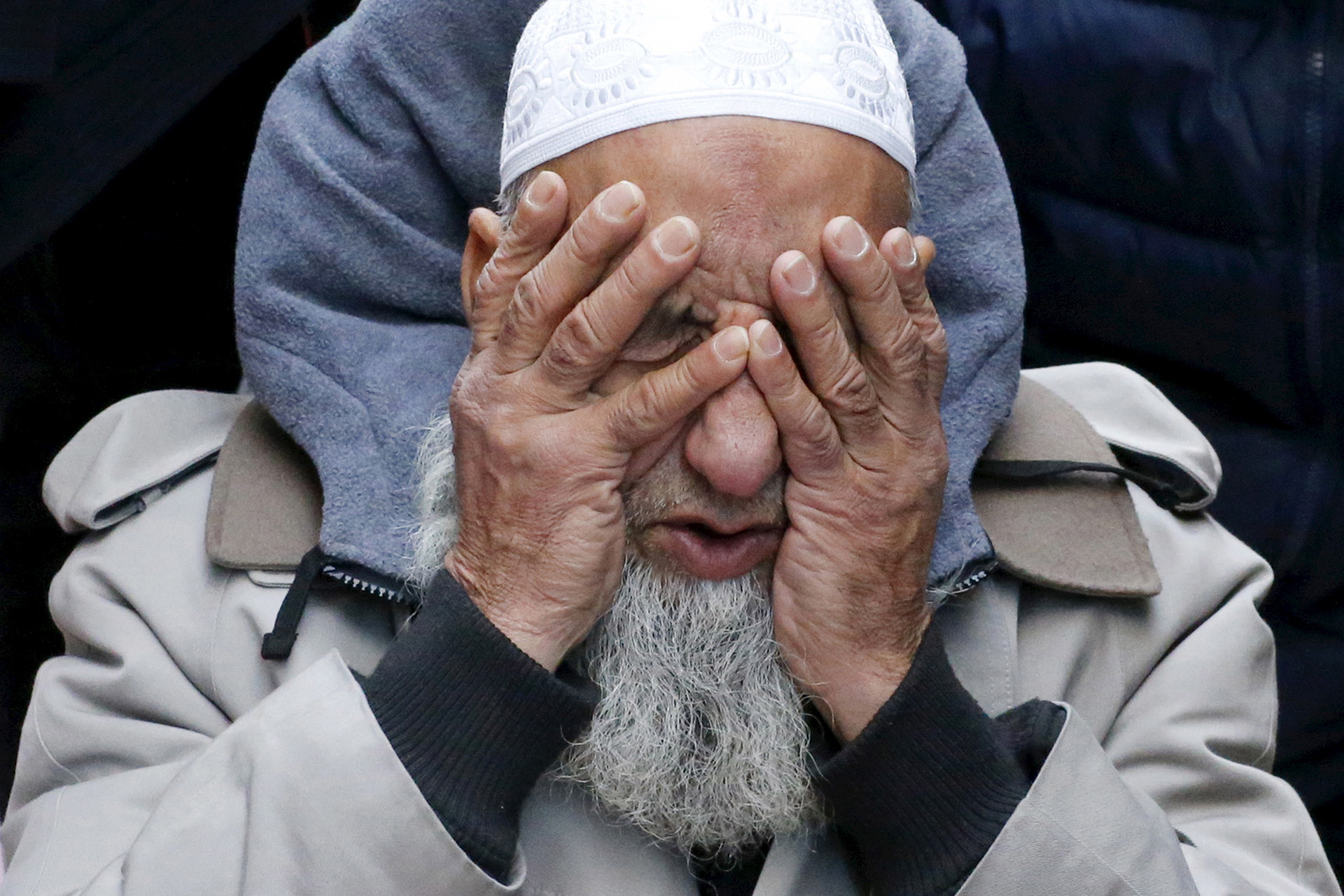
A Muslim man prays while people shout slogans against U.S. Republican presidential candidate Donald Trump outside of his office in Manhattan, New York: photo by Eduardo Munoz/Reuters, 21 December 2015

Druze women mourn their relatives Farhan al-Shaalan and Samir Kantar, who were killed from an Israeli airstrike near the Syrian capital, in the Druze village of Ein Kinya in the Israeli controlled Golan Heights, near the border with Syriak: photo by Ariel Schalit/AP, 21 December 2015
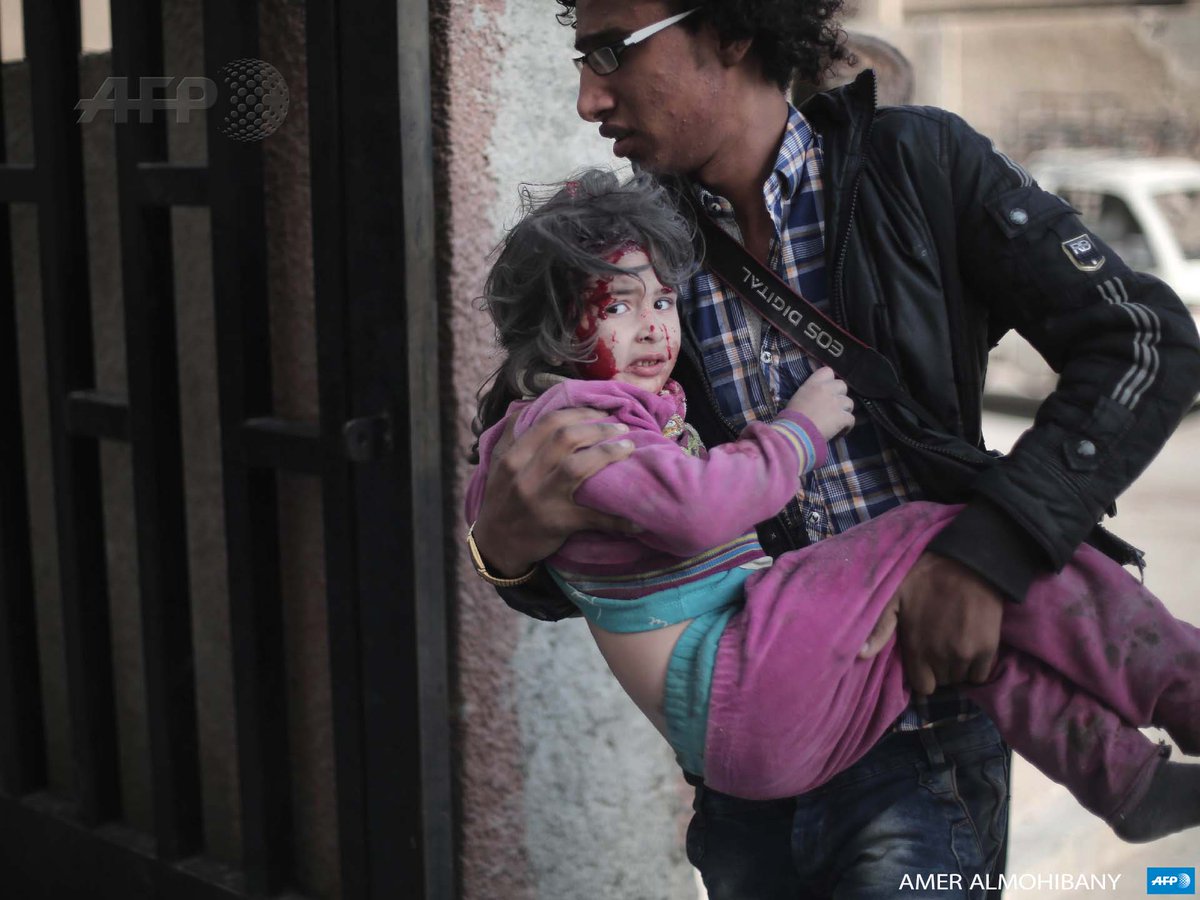
SYRIA
- A Syrian photographer carries injured girl following air strikes on
al-Nashabiyah. By Amer Almohibany By @RAtanasovski #AFP: image via Frédérique Geffard @fgffardAFP, 15 December 2015
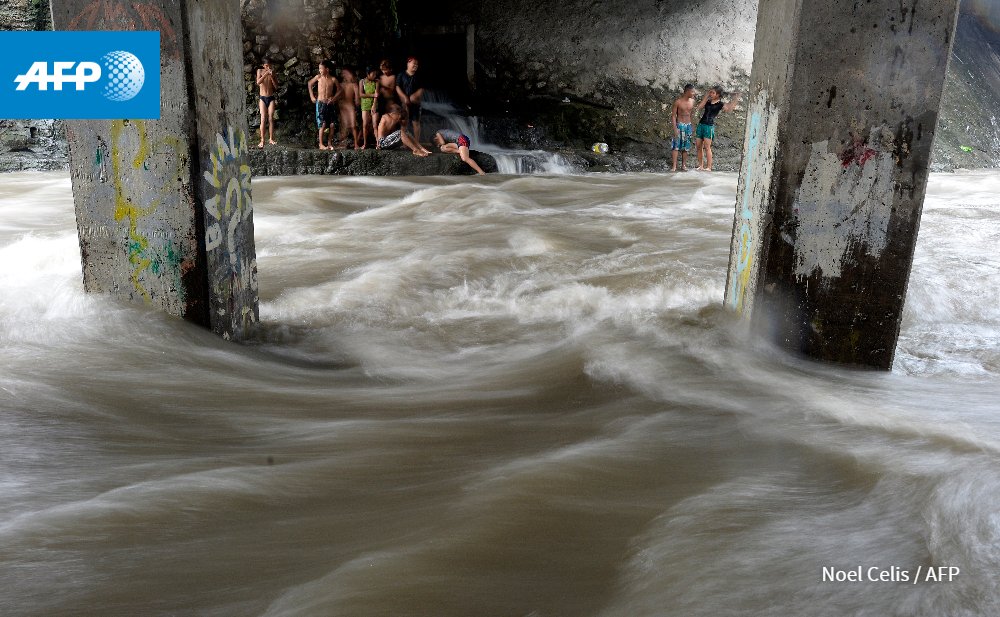
#floods in Manila, Philippines #AFP Photo by @afp_noel: photo by
Aurelia BAILLY @AureliaBAILLY, 19 December 2015
Christmas decorations for sale in the Shia holy city of Najaf on Thursday: photo by Haidar Hamdan/AFP, 17 December 2015
Palestinian women mourn as they take the last look at the body of Yahya Taha, 21, who was killed during clashes with Israeli troops following an Israeli army raid, at the family house during his funeral in the West Bank village of Qattana, near Ramallah, Thursday: photo by Nasser Nasser/AP, 26 November 2015
Filipino, Fil Binay battles to contain a fire in Mandaluyong City, east of Manila, Philippines: photo by Mark R. Cristino/EPA, 25 November 2015
A man walks past steam rising from underground heating pipes outside a shopping mall in Beijing: photo by Greg Baker/AFP, 17 December 2015
Siberian gulls hover over Sangam, the confluence of the Ganges and Yamuna Rivers, in Allahabad, India. The gulls travel thousands of miles to India during the Siberian winter in October and return home in March: photo by Rajesh Kumar Singh/AP, 17 December 2015
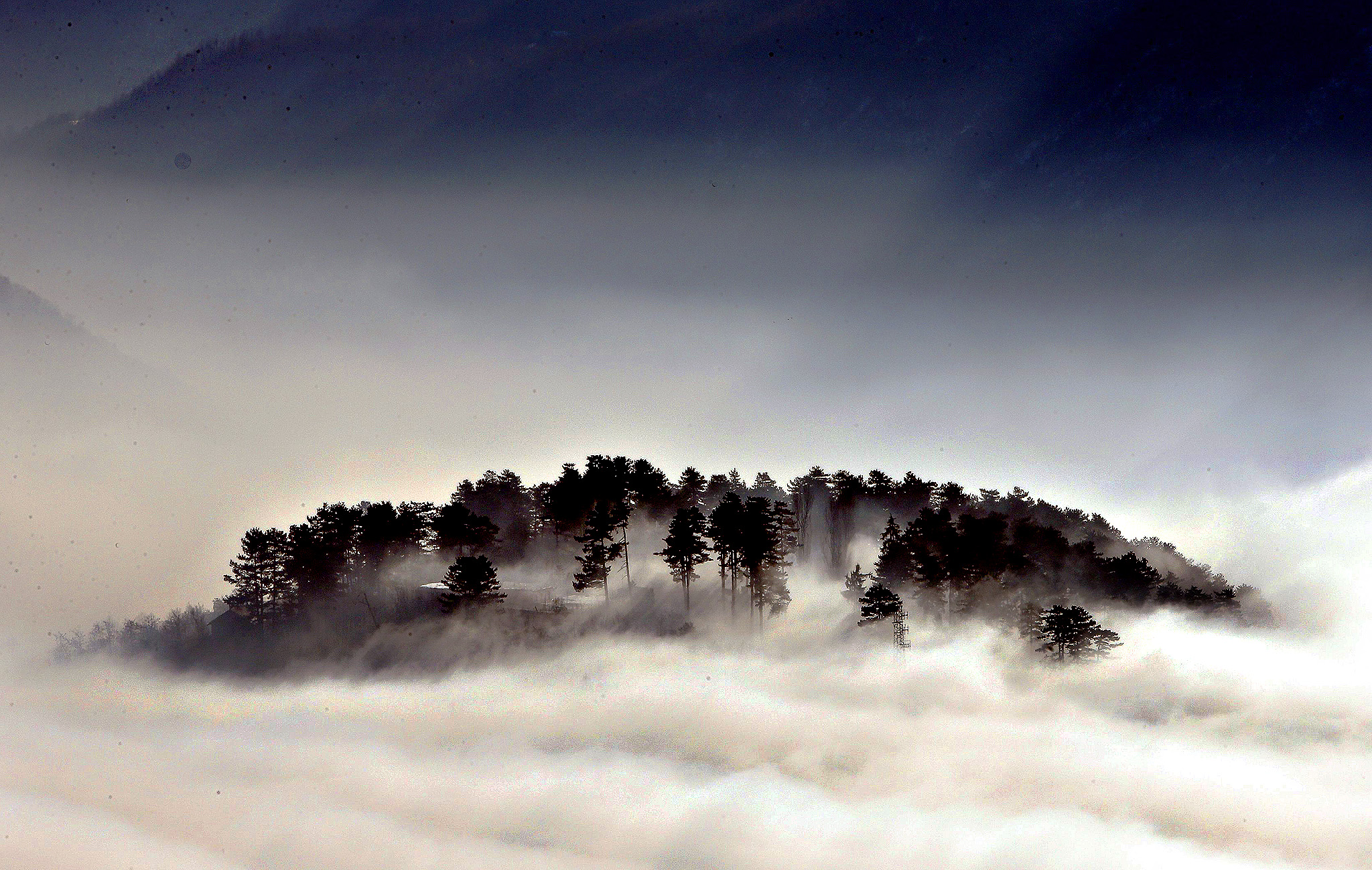
An elevation in the city of Sarajevo, Bosnia and Herzegovina, covered in a thick layer of fog, on Monday. Due to high levels of NO2 (nitrogen dioxide) in the air over the city and a certain meteorological condition, residents of Sarajevo were recommended to reduce their movement in the streets and to reduce car traffic: photo by Fehim Demir/EPA, 21 December 2015
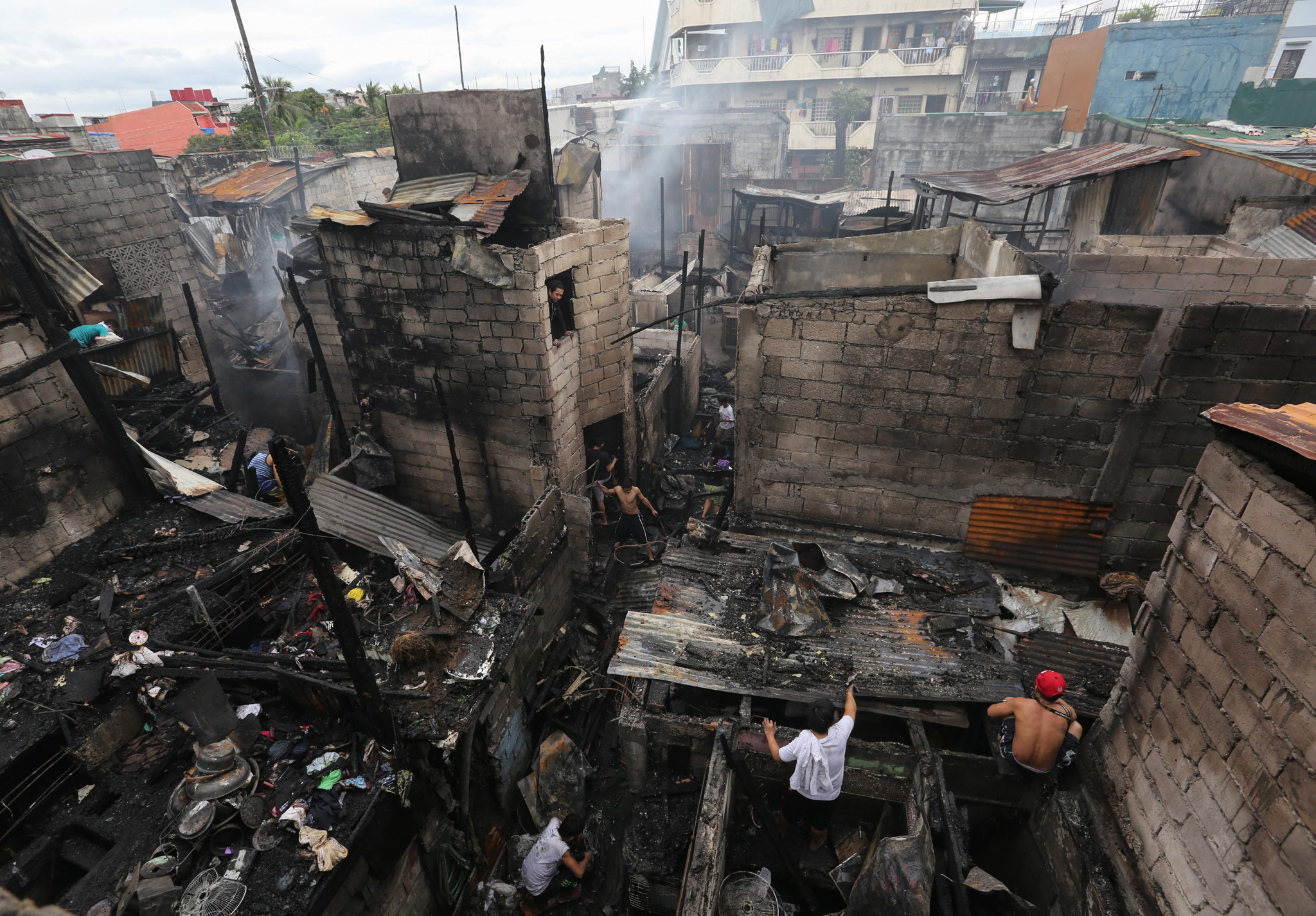
Filipinos search for salvageable materials following a fire in Manila: photo by Mark R. Cristino/EPA, 17 December 2015

A Palestinian dressed up as Santa Claus talks to an Israeli soldier during a demonstration in front of a gate along the Israeli controversial separation wall in the West Bank city of Bethlehem, on Friday: photo by Musa Al Shaer/AFP, 18 December 2015




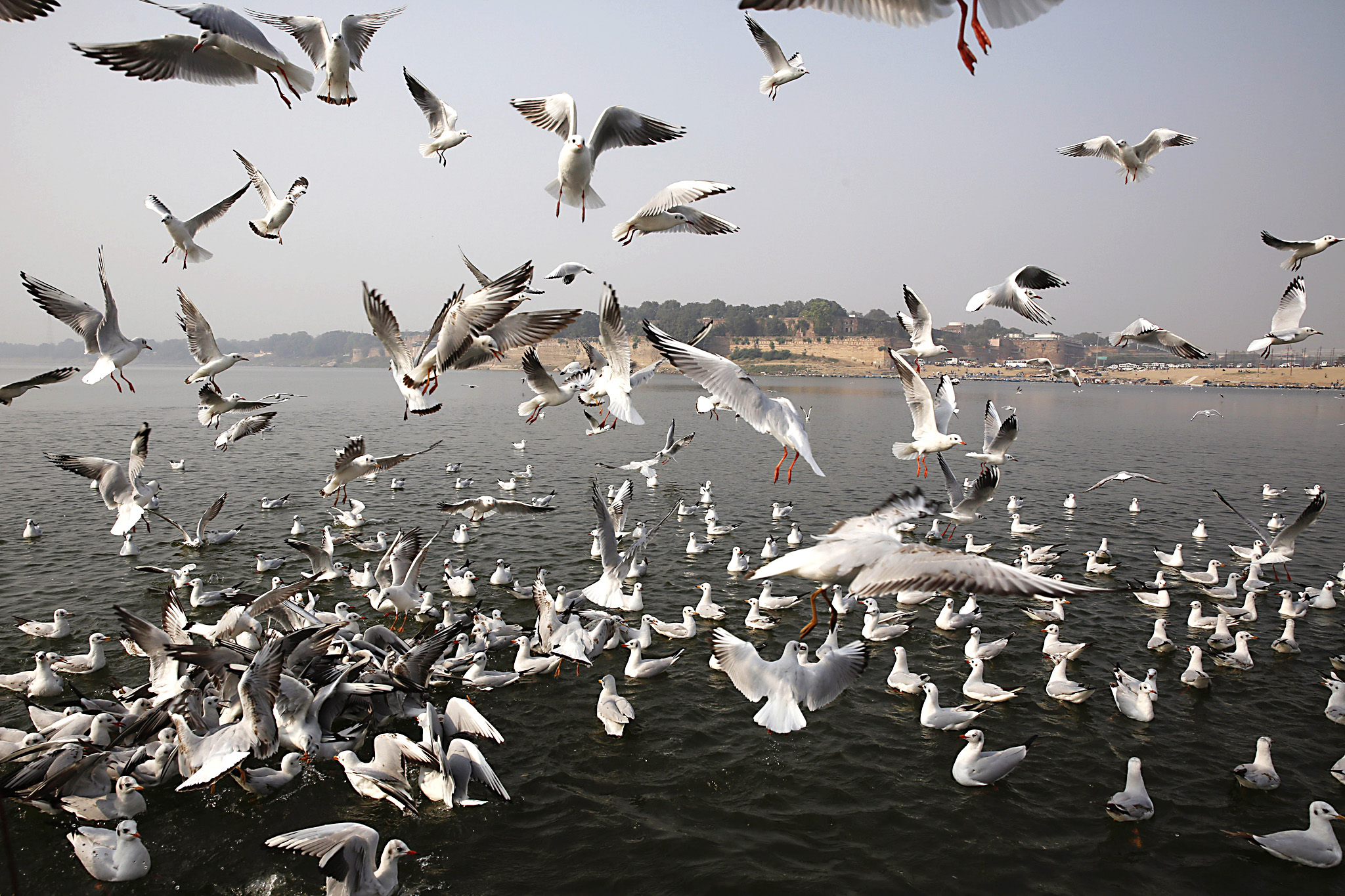



12 comments:
THE STORY OF ABRAHAM
The story of Abraham is the
story of all of us
We are the sacrifice
It’s unthinkable that we
have to die
Leave these golden mountains
these multicolored antelopes
We’re face to face with the knife
held in our father’s hands
knowing he’s just obeying God
That Voice that
came to him with
thunderous urgency
to march us both to the
rough hilltop
to expose our delicate throats to the
sunlight’s inexorable blade
That single slice
It’s really unthinkable
when you think about it
and we don’t always
Pretty horses prancing against green
hillsides take our minds off it
for a happy moment
Our father
what can I say?
You’re looking at me with
all Your impossible love
Where do we go?
How can we escape?
And if we do
where do we go?
God sent down a ram
as substitute
wool still glistening with divine
wetness
I was let go
and my father and I
walked hand in hand
down the hill
home
Shall we put the ramskin
on us then?
And when that ram’s time
comes
shall it put on
man’s?
_________________________________________
12/13/15 (from Sounding to Zero, in progress)
well, fortunately or naively or compartmentally or etc. I don't suffer from the perspective of Larkin in the poem and letters, maybe only because I've been face to face with it a few times...but the photos you juxtapose with the poem and letter fragments do make me deeply sad for the human condition in the circumstances and conditions evoked in them...as always Tom, you make us see these things for what they are and how they all connect...thank you once again...
Abdal-Hayy and Michael,
Well, I believe what we may have here is a panel of experts. Between the three of us. how many more return trips into the shadows do we have left?
It’s unthinkable that we
have to die
That single slice
It’s really unthinkable
when you think about it
It does seem true on the face of it that one can't think about the unthinkable... and yet, and yet... it does equally seem acutely true, some days, that there's really nothing else worth thinking about, if we are to be honest with ourselves.
I mean, that is, the brevity and fragility and vulnerability of what was once called "our time here on earth".
On the other hand, one might also take our continuous intimations of mortality as the most appalling characteristic of the species. At least animals don't have to spend their precious moments on deathbound meditation. The pains of the body are enough, without the attendant knowledge. It makes such great bores of us, unless we manage to keep busy somehow, and think about other stuff.
This was effectively Larkin's last gasp as a poet, the last poem of any serious dimension he attempted. It is a joyless thing, but it is honest, and the honesty appears the product of a struggle. The degree to which he may have been affected by the loss of his mother, and by the particularly bleak circumstances of her last years, with his own prospects at this point beginning to appear not all that dissimilar, probably ought to be factored in here -- the bleakness not exactly "coming out of nowhere".
But of course material trials and imminent causes of trepidation abound in the world, this world, for indeed there is no other, as several of those people seen in the photos would have to attest. And at least they are being kept busy. For librarians there is only what Larkin called "passive suffering" -- hardly a heroic thing, really.
Michael's point about death maybe seeming not quite so bad once you're already in the neighborhood -- I do get that, while also remembering that, having been brought back to consciousness with a quart of blood gone, one side of my head hanging off and my neck broken, my crazy emergency night ride to the county hospital, during which something resembling my body dropped out of and returned to life three times, seemed at the time almost like -- what would be the word, "okay"? "Not all that bad"?
But of course that's cheating. I was being blasted out of fear and into acceptance and resignation not by philosophy but by a morphine drip. You can't always count on getting one of those.
Bone tumours, pneumonia recurring, the rains crashing down, where's my acceptance, hey, where's my drip, ho ho ho.
To feel "deeply sad for the human condition" seems to me now the only proper attitude for a sensible adult to have, anywhere, anymore.
But it's different for kids and Santas, I expect.
It’s a struggle from the very get-go. We struggle to be born and we struggle to die. As to the time in between, the photographs speak eloquently to that: an incomprehensible mix of beauty and horror. But at some point, maybe earlier for Larkin, maybe later for others, there’s the struggle with letting go. The body breaks down with reluctance. The body, in its own broken fashion, works to stay alive until the very last minute.
Oh, my. No let-go, from the get-go, for the doomed mind, while the body flails away more or less obliviously, running on reflex, doing the only thing it knows how to do, until it can't.
It was the reckoning with his mother's death which moved Larkin to revive and repair this poem, with the final stroke coming in a drastic overhaul of the ending -- those terminal postmen arrive. Bingo.
Some six years after finishing those lines, Larkin himself, at the still-middlish age of 63, was dead on the bathroom floor. A lonely conclusion one imagines, though as I dimly recall he was not literally alone, as the last of his problematic loves was there on the other side of the door, unable to get in to offer aid or succour, because the lifeless body was lodged against the door.
This is a great post. I haven't read that Larkin poem in years, but its power, honesty, and lucidity (like the light entering the room) are so brilliant & chilling. Michael has a tremendous non-religious spiritual discipline that I envy. But, for me, our future non-existence is maddeningly horrifying and intellectually elusive. Larkin circles the whole matter cunningly and bravely, and with such virtuosic artistry, that it's almost exhilarating. He remains alive in the work! Not exactly what Woody Allen or any of us really want, but it's better than the big Nihil.
Wow
. . . "The mind blanks at the glare" . . .
A beautiful Larkin poem Tom, unflinching in the face of the inevitable -- very moving. My mother took her last breath less than a week ago (11:00 AM last Thursday), having just turned 92 -- a good long life, no illnesses or broken bones or strokes, maybe she had pneumonia (?) or at least it was shortness of breath, maybe brought on (as she would say) by having grown up in China where the air was bad (dust storms I think, not pollution), makes me think of all those people living in the smog-filled air there now, or those breathing the nitrogen dioxided air there in Sarajevo . . . all of us heading one way or another toward Larkin's
"Not . . . here, / Not . . . anywhere, / And soon . . ."
Jeez, guys. What can one say. Condolences to Steve, all credit to Steve's mother for hanging on so well, for so long. Major dittos on every word just said by tpw (who hasn't mentioned his own recent loss, a beloved big brother). Me too, Hilton.
Where we go now, death goes with us, sometimes mercifully hanging back in the shadows, sometimes not so merciful, pressing. Another way of saying that is that I haven't been at all well, and am embarrassed that it's showing, yet not embarrassed enough to want to spend my precious remaining moments trying to lie about the facts of life, which we all know about, which we all do face, with varying degrees of courage, not much of it in my case, but still.
On the other hand, there is the tremendously moving feeling of consolation and support that comes from having a few likeminded friends, and what do you know, all of mine are here.
As for that noxious Chinese air which we here on the West Coast must breathe every day if we are to attempt to breathe at all -- this month, with the recurrence of old pal pneumonia, has been an interesting geography lesson I'd just as soon not have received, and I've spent much of it murmuring internally those famous last words of Michael Brown.
For what it's worth, here's the grand old man of Alexandria counting his candles fore and aft. http://www.cavafy.com/poems/content.asp?id=80&cat=1
It's worth a lot right now, Vassilis, thank you.
C.P. Cavafy: Candles
Days to come stand in front of us
like a row of lighted candles—
golden, warm, and vivid candles.
Days gone by fall behind us,
a gloomy line of snuffed-out candles;
the nearest are smoking still,
cold, melted, and bent.
I don’t want to look at them: their shape saddens me,
and it saddens me to remember their original light.
I look ahead at my lighted candles.
I don’t want to turn for fear of seeing, terrified,
how quickly that dark line gets longer,
how quickly the snuffed-out candles proliferate.
Translated by Edmund Keeley/Philip Sherrard
(C.P. Cavafy, Collected Poems. Translated by Edmund Keeley and Philip Sherrard. Edited by George Savidis. Revised Edition. Princeton University Press, 1992)
Tom, the air here as clear as might be given all this cold wet airmass moving through today -- bright glare off water followed by dark grey cloud squalls followed by double rainbows against the ridge this afternoon, one of whose colors were as bright as can be (and soon gone) -- a fleeting glimpse of some imagined world beyond this one, was it . . . ? Time to take a deep breath and go on . . .
Post a Comment